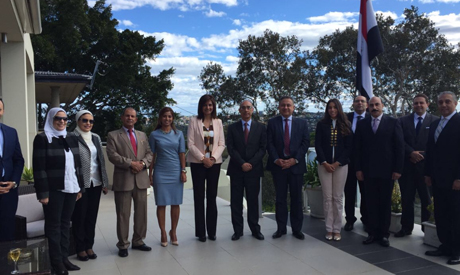At El Haram Street, situated just kilometers away from the Great Pyramids of Giza, stands Baheya.
The six- stories building was originally a villa owned by the late wife of a member of the Osman business dynasty -- one of the foremost contractors in modern Egypt.
The late Baheya suffered from breast cancer and her children decided to commemorate her name by donating land and eventually establishing the Baheya Hospital.
It was built on an area of 10,000 square meters and offers for the first time in Egypt everything related to spreading awareness on breast cancer and easing the journey of agony travelled by patients, totally free of charge.
"Since its inauguration in February 2015, The Baheya NGO had a different take, not only offering a helping hand to thousands of breast cancer patients in Egypt, but also tackling the roots of the problem through prevention and awareness," Hazem El-leithy, a member of the board, told Ahram Online.
El-leithy said that since its opening, Baheya, which is the first breast cancer hospital in the Middle East to be totally free of charge and that has so far served more than 18,000 women, has offered 14,100 mammograms and performed 12,275 surgical procedures.
The number of patients undergoing chemotherapy at the hospital surpassed 1,200, and more than 450 have received radiation therapy.
Baheya is also equipped with a research lab dedicated to studying and analysing the reasons behind the prevalence of breast cancer in Egypt and the region, hoping to occupy a leading role in containing the disease.
"Not only does Baheya provide physical treatment for the patients, but it is also the first to provide comprehensive psychological and social support programmes for patients and their families.
"It is also the only hospital that offers in-hospital therapy to help patients cope with the ailment," he explained.
In July, Baheya made headlines when it collaborated with the Egyptian Red Crescent (ERC) to launch the first support programme for cancer patients.
“Cancer patients suffer stress similar to major traumas with long-term consequences. Many women are unable to afford psychological support. Recent studies have shown that severe depression and anxiety affect 50% of patients and that moral support can minimise mortality, which can reach 39% in depressive patients, by 50%," Dr Ahmad Hassan Abdel Aziz, head of the Oncology Department at the hospital, told Ahram Online at the time.
"Early detection during the first stages of cancer achieves cure rates of over 98%, and 93% during the second stage, while timely psychological support boosts cure rates," Abdel Aziz had said.
This October, and in commemoration of the dedication of the month to breast cancer worldwide, Baheya intensified its activities, launching campaigns, bicycle rides, marathons and many other events to spread the word of awareness .
From 9 until 18 October, the endeavors reached out further, as a delegation from Baheya headed to Australia and New Zealand, accompanying the Minister of Immigration and Egyptian Expatriate Affairs, Nabila Makram Ebeid.

Baheya representative at the consulate house in Sydney with the minster, ambassador, consul and delegation( courtesy of Baheya)
"Baheya wanted Egyptians abroad to know more about the breast cancer situations in Egypt, and get more acquainted with ways to extend help and support," Hanan Abdel Rahman, member of the Baheya delegation and a fundraiser, told Ahram Online.
Abdel Rahman says the response was overwhelming.
"Whether in the Egyptian embassy, the consulate, churches or mosques, the Egyptian communities -- in Sydney, Canberra, Melbourne and Auckland -- were more than eager to meet and find out about the success stories in Egypt and understand the challenges to be able to help their country," she says.
The National Cancer Registry in Egypt showed that cancer cases in the country at the end of 2014 reached 113 new cases for every 100,000 people every year.
In regards to males, on top of the list came liver cancer -- due to the widespread of hepatitis C -- with 39 cases for every 10,000 persons annually, followed by bladder, lung, lymph glands, and prostate cancer, respectively.
As for women, breast cancer came on top, with 35 cases per 10,000, followed by cancers of the liver, ovaries, and lymph glands.
Short link: